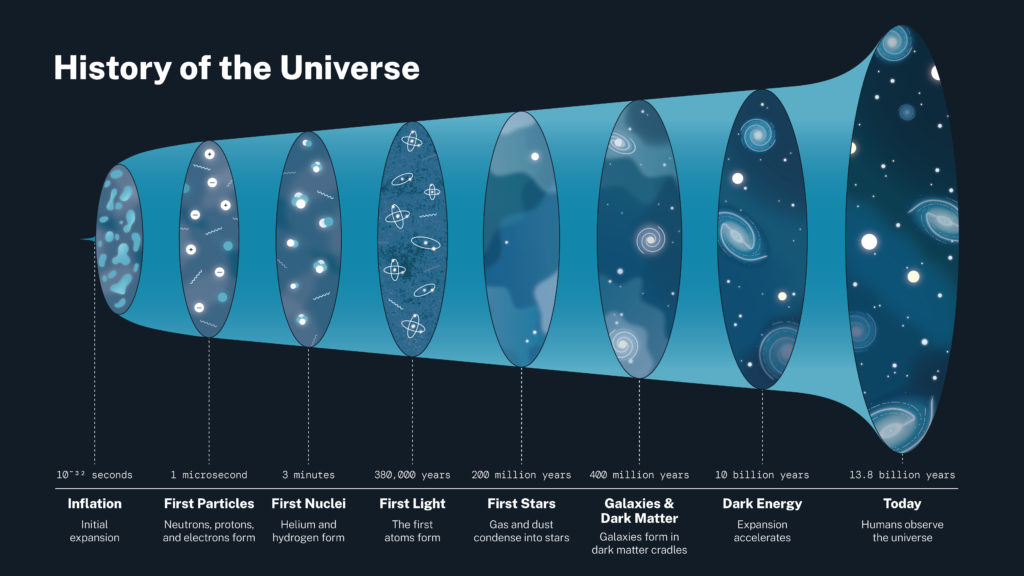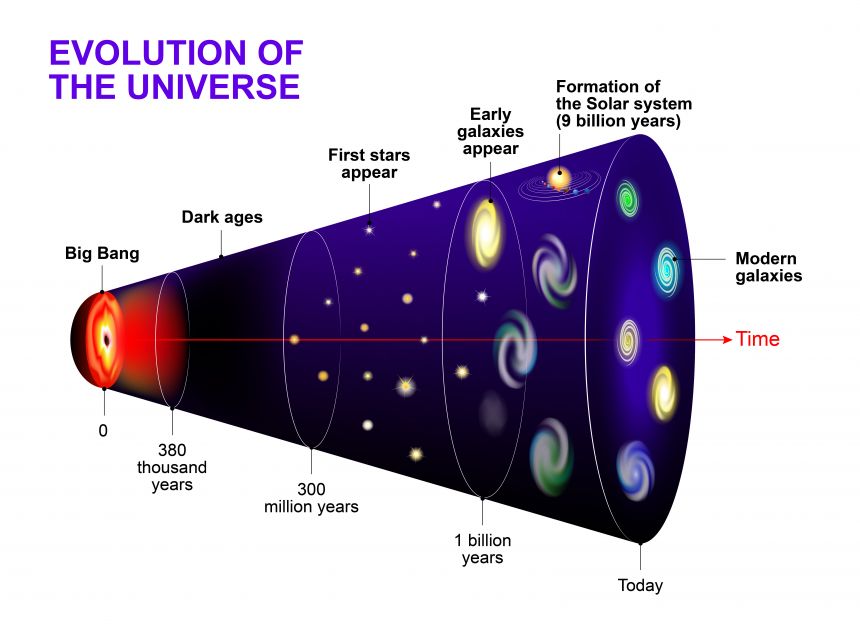There is always curiosity about our universe, how it started, how it will end, what is happening at the moment, etc, and its origin is a topic of great interest and debate among scientists. There are a few theories that support the origin of the universe.
The Big Bang theory is the best-supported theory by most scientists of our universe’s origin is through an event . According to the Big Bang theory, the universe started as a singularity, a point of infinite density and temperature, about 14 billion years ago.
The cosmologists approved this theory after the successful observation of various theories. The universe is expanding because galaxies appear to speed away from each other. Their mutual distances are continuously increasing. We can observe this through the phenomenon known as redshift
Understanding the universe in detail is never easy. Many scientists have many ideas about it. One of the most vital progresses in space science is our understanding of its origins and expansion. Cosmologists have used various telescopes and other advanced scientific instruments to observe the early universe and collect data on its formation and expansion.

The Big Bang theory was first suggested by first proposed by Georges Lemaître in 1927. He was the first to theorizes that the universe began from a single primordial atom. This idea received major boosts from Edwin Hubble’s observations that galaxies are moving away from us in all directions, as well as from the 1960s discovery of the cosmic microwave background radiation, interpreted as the proof of the Big Bang.
The universe is constantly expanding in all the direction now. The theory mainly explains the universe’s expansion and evolution. The event that triggered this expansion remains a mystery. Scientists are still unknow about and trying to understand what was the cause of the Big Bang and what caused the initial burst of expansion.
This data, analysis it and conclusion have led to the development of the Big Bang Theory. According to this, the universe began as a single point of infinite density and has been expanding ever since. This theory about the evolution of the universe is widely accepted by the majority of the scientific society.

According to the theory, just after the Big Bang, the universe began to expand and cool and matter started to form as well. Hydrogen and Helium nuclei were created in the first few minutes but these nuclei later became the building blocks for stars and galaxies and the whole universe.

As time passed, the force of gravity caused the matter to accumulate to form galaxies and clusters of galaxies. Inside these galaxies, another process started in which stars were born and eventually died that releasing heavy elements into the universe. These particles are now the building blocks for the planets and life that we know now.
While the Big Bang theory is the most widely accepted theory to explain the origins of the universe, other theories have also been proposed, such as the steady-state theory and the cyclic model but these theories have not been supported by as much evidence for the Big Bang theory.

In the early universe, Radiation was so massive that it started colliding with the photons and formed pairs of particles made of matter and antimatter, which is likely to be matter in every way except with the opposite electrical charge. At the beginning of the universe, it contained same amount of matter and antimatter.
But as the universe continuously cooled down, photons no longer had enough punch to make matter-antimatter pairs. So, Numerous particles of matter and antimatter coupled off and destroyed one another.
Another very important point to be noted, there wasn’t a single star in the universe until about 180 million years after the Big Bang theory. It was taking too long for gravity to hold clouds of hydrogen and to form them into stars.
Many physicists think that vast clouds of dark matter, a still-unknown material that exceeds visible matter by more than five to one.
[ref-nationalgeographic]

2 comments
Astro kobi
This always be mysterious. Nice article
ma nepali
The Big Bang was the moment 13.8 billion years ago when the universe began as a tiny, dense, fireball that exploded. Most astronomers use the Big Bang theory to explain how the universe began.. good article